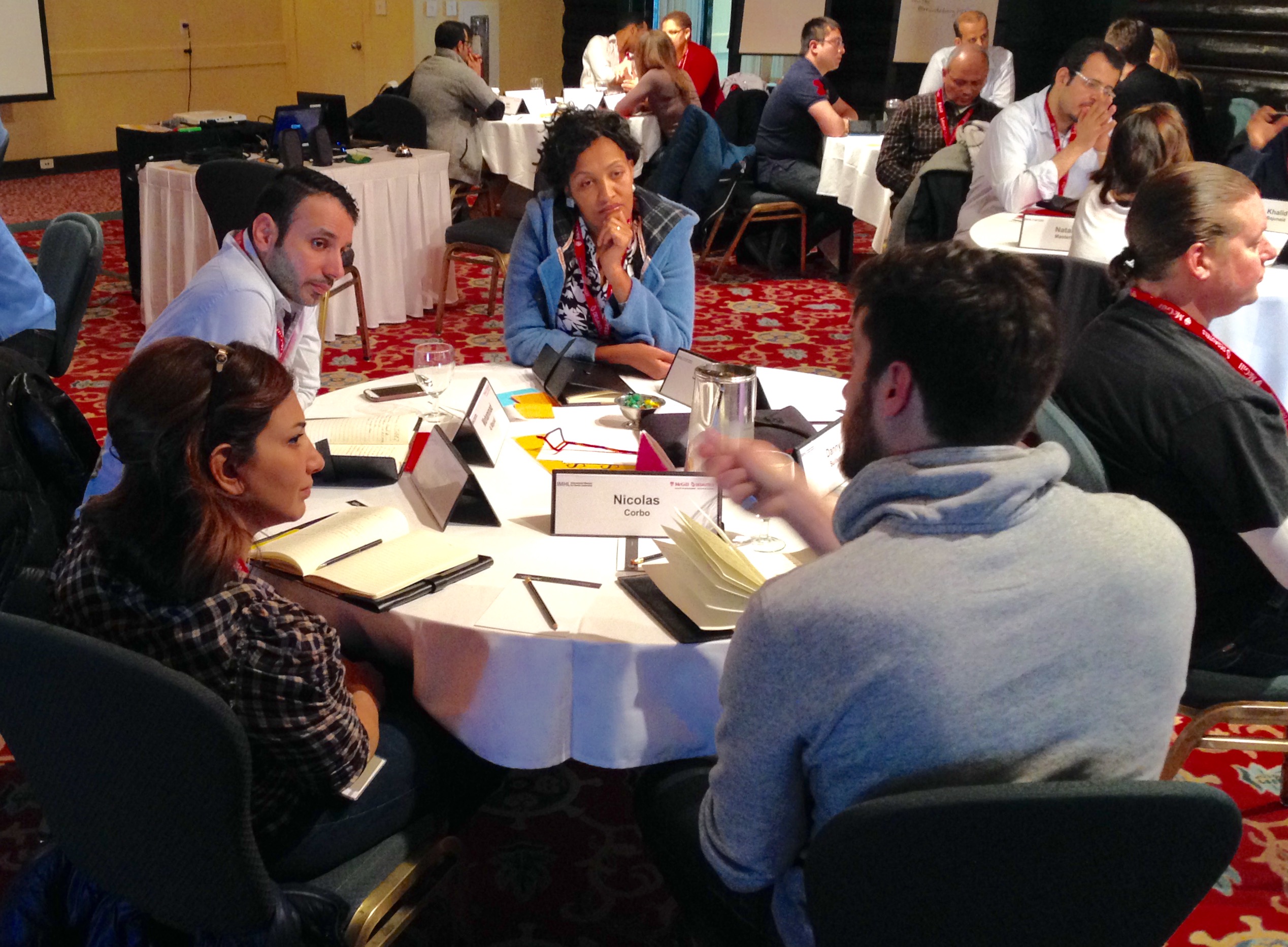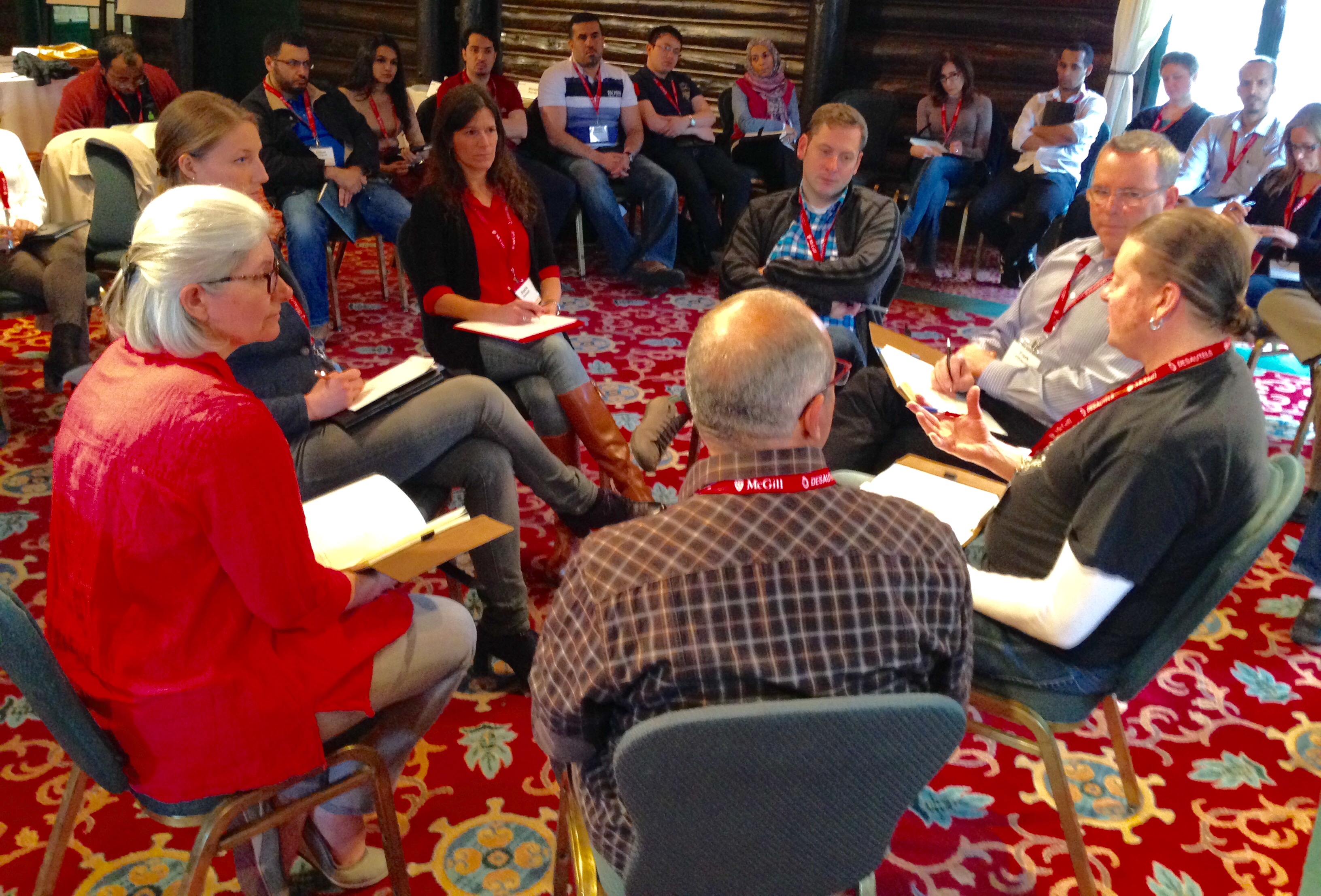The Reflective Mindset: Keynote Listening
24 April 2015This weeks’ TWOG, and maybe the next, are being brought to you live, so to speak, from our International Masters for Health Leadership (mcgill.ca/imhl). I will be in class most of these two weeks, so I decided to bring you along, to some of the interesting happenings. (On Monday April 27, from 9:45 am to about noon NY time, you are invited to a live streaming I will be doing from this class, on myths, managing, and health care.)
Thirty-five people from around the world, all experienced in various aspects of health care, are here, in the Château Montebello near Montreal—the world’s largest log cabin. This is a new class, for the first of five 11 day modules, called the Reflective Mindset. Among these participants, please meet, in the photo below (clockwise from the top), Seble, who is a flying doctor for emergency medicine in Ethiopia, Danny, a forensic psychiatrist from Australia, Nick, a sales manager in a medical records firm in Canada, Khuzama, a dermatologist, and Mohammad, a radiologist, both from Saudi Arabia. Here is some of what’s been happening.

Turning the Tables
Professionals see themselves as providers of services. So to set a reflective tone, on day 2 we turned the tables and asked everybody to tell each other stores about their experiences as users of these services. Great stories came out—happy ones, as you might expect, but horror ones too. The latter indicated that the people who are supposed to know the system best are apparently not immune to its problems. “No-one ever teaches the non-physician how to navigate the health care system” someone had said. Nor physicians themselves?
Listening to both kinds of stories, someone else asked: “We know how to get it right, so how come we so often get it wrong?” In other words, why can’t there be better learning, more reflecting, across health care organizations themselves? We’ll get back to all these questions in later modules.
Turning our Backs
The participants in the IMHL don’t sit in nice neat rows, listening obediently to some professor. They sit at small round tables so that they can spend about half the class time sharing insights from their own experience. Every day begins with “morning reflections”: first they write their thoughts in an Insight Book, then they discuss these with the group around the table, and finally they sit in a big circle to bring out the best ideas.
A great deal of thoughtfulness comes out of this. Morning reflections are, in fact, the glue that binds the learning of the IMHL together. These first days, the ability to listen has been getting a lot of attention. For example, “Why don’t we let go and really listen---listen with the ears and see with the eyes of the other?” Physicians listening to their patients, and to each other (bearing in mind that all “patients” are people, but not all people are patients, at least if the promotion of health is to matter); managers listening to the professionals, and professionals listening to the managers. After all, if they can do it here, why not in their institutions?
So for morning reflection on the fourth day, we turned, not the tables, but one person at each table--in the above photo that’s Danny with his back turned—to be the “keynote listener.” (Thanks to our colleague Jonathan Gosling for this term.) Then, as you can see in the second photo, these listeners sat in the middle of the big circle and became the talkers—about what they heard. “We thought we’re taught to do [listening] as clinicians, but maybe we’re learning it for the first time.”

Welcome to the Confusion
With these kinds of things happening—not usual in most development programs, let alone in the everyday life of most people—it was not surprising to hear from more than one that “I’m confused.” Good thing, because as Jack Welch once observed, “If you’re not confused, you don’t know what’s going on.” So not long after came this comment: “I have started to discover that being confused can be a good thing. It means I am letting go of my own fixed way of viewing things and getting ready to appreciate how others see things.”
Welcome to the Reflective Mindset!
“Experience is not what happens to you. It’s what you do with what happens to you.” (Aldous Huxley)
© Henry Mintzberg 2015, who is also involved in such things in the International Masters for Practicing Management (impm.org) for business managers. The next class is November 2015.
Tatiana Saliba has been organizing the tweets for this TWOG for eight months now, every single week since September 2. Thank you Tatiana for so much help in getting it going!